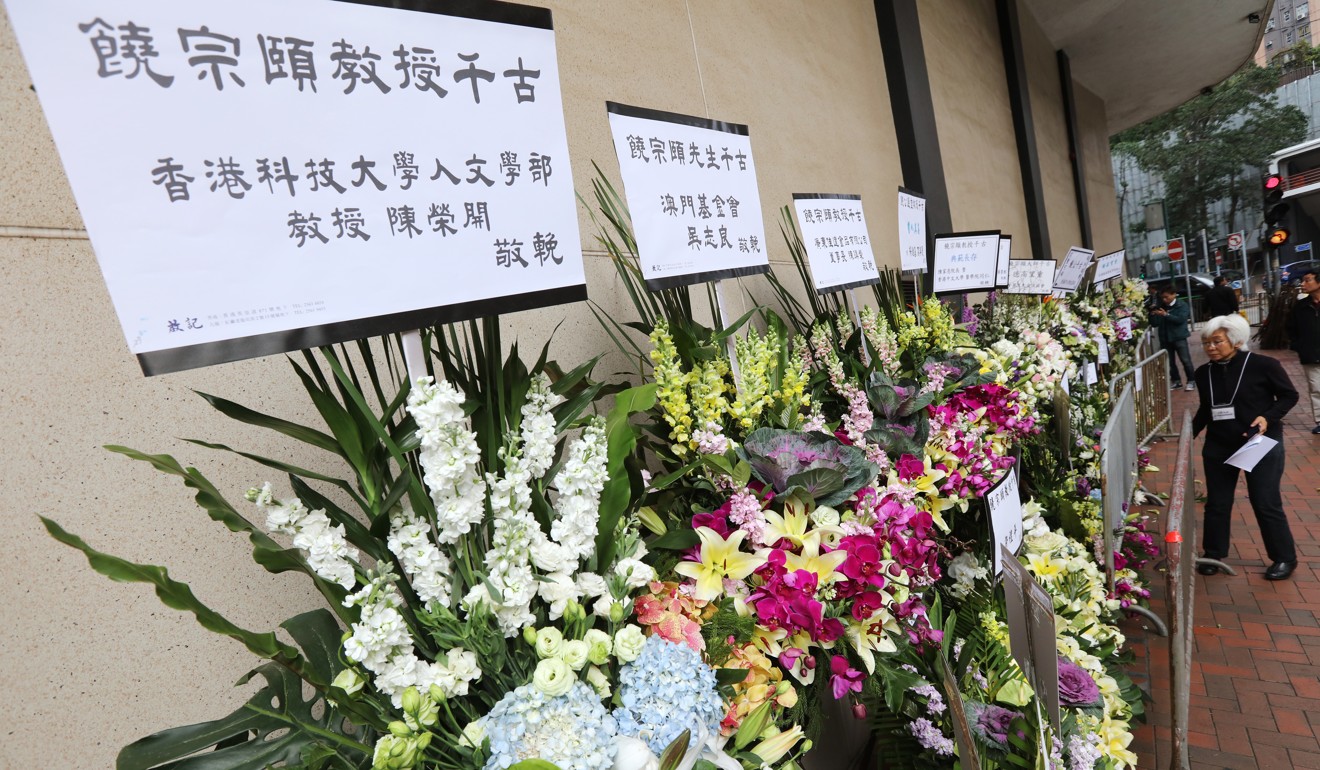
Hong Kong and mainland leaders pay tribute at funeral of renowned scholar Jao Tsung-i
President Xi Jinping and state leaders send flowers and condolences, while Chief Executive Carrie Lam and city’s senior officials act as pallbearers

Tributes poured in at the funeral of renowned sinologist Jao Tsung-i on a cloudy Wednesday morning, with Chief Executive Carrie Lam Cheng Yuet-ngor and other senior Hong Kong officials acting as pallbearers before the late scholar’s body was escorted to Po Lin Monastery.
Jao’s body will be cremated at the Lantau Island site later on Wednesday, after the chanting of contemplative verses by the monks, a Buddhist funeral tradition, Professor Lee Chack-fan, director of the Jao Tsung-i Petite Ecole at the University of Hong Kong, said on behalf of Jao’s family.
President Xi Jinping sent flowers and his condolences to the family, along with Premier Li Keqiang, state councillor Yang Jiechi and a dozen more officials from Beijing, according to the funeral committee.

The funeral was held at the Hong Kong Funeral Home in North Point on the eastern side of Hong Kong Island. Flowers from local companies, publishers and academics across the globe lined both sides of the hall. The ceremony ended at noon with rituals at the monastery later.
A spirit tablet in memory of Jao would be established at the foot of the 34-metre Buddha statue at the monastery, Lee said.
Lam and former chief executive Tung Chee-hwa, now vice-chairman of the Chinese People’s Political Consultative Conference, were among the pallbearers, along with Rocky Tuan and Paul Tam, president of Chinese University and acting president of the University of Hong Kong respectively, where Jao worked and taught.
Dr Tang Wai-hung, the late scholar’s son-in-law, wrapped up the funeral after condolence speeches by Lam and French sinologist Leon Vandermeersch.
Lee said Jao’s sinology research was the cultural foundation of the “Belt and Road Initiative”, the central government’s trade initiative.
Vandermeersch said Jao was one of the greatest scholars in China’s history.
“The luckiest thing [that] ever happened to me was to be a student of professor Jao,” the 90-year-old scholar said in his speech.
Representing Jao’s family, Tang thanked all the attendees and people who paid tribute.
Jao died on February 6 at his home in Happy Valley. He was 100.
Hailed as the “pride of Hong Kong” by premier Li, Jao was regarded as one of China’s two greatest sinologists, together with Ji Xianlin of the mainland, who died in 2009.
The Jao Tsung-I Academy in Kowloon, at the former Lai Chi Kok Hospital complex, was named after the professor.
Born in Chiuchow – now Chaozhou – in Guangdong province in 1917, Jao was self-taught. After quitting school in Form One, he immersed himself in his banker father’s extensive book collection. From then on he excelled in the humanities, studying everything from Sanskrit to the art of the Dunhuang grottoes.
The scope of Jao’s research spanned more than a dozen topics related to Chinese culture, including ancient history, oracle bone inscriptions and Chu Ci – an anthology of Chinese poetry with roots in the Warring States period (475-221 BC).
A prolific writer, Jao is credited with producing more than 900 scholarly articles in addition to literary works, calligraphy, paintings, and pieces for the guqin, or Chinese zither, an ancient stringed instrument.